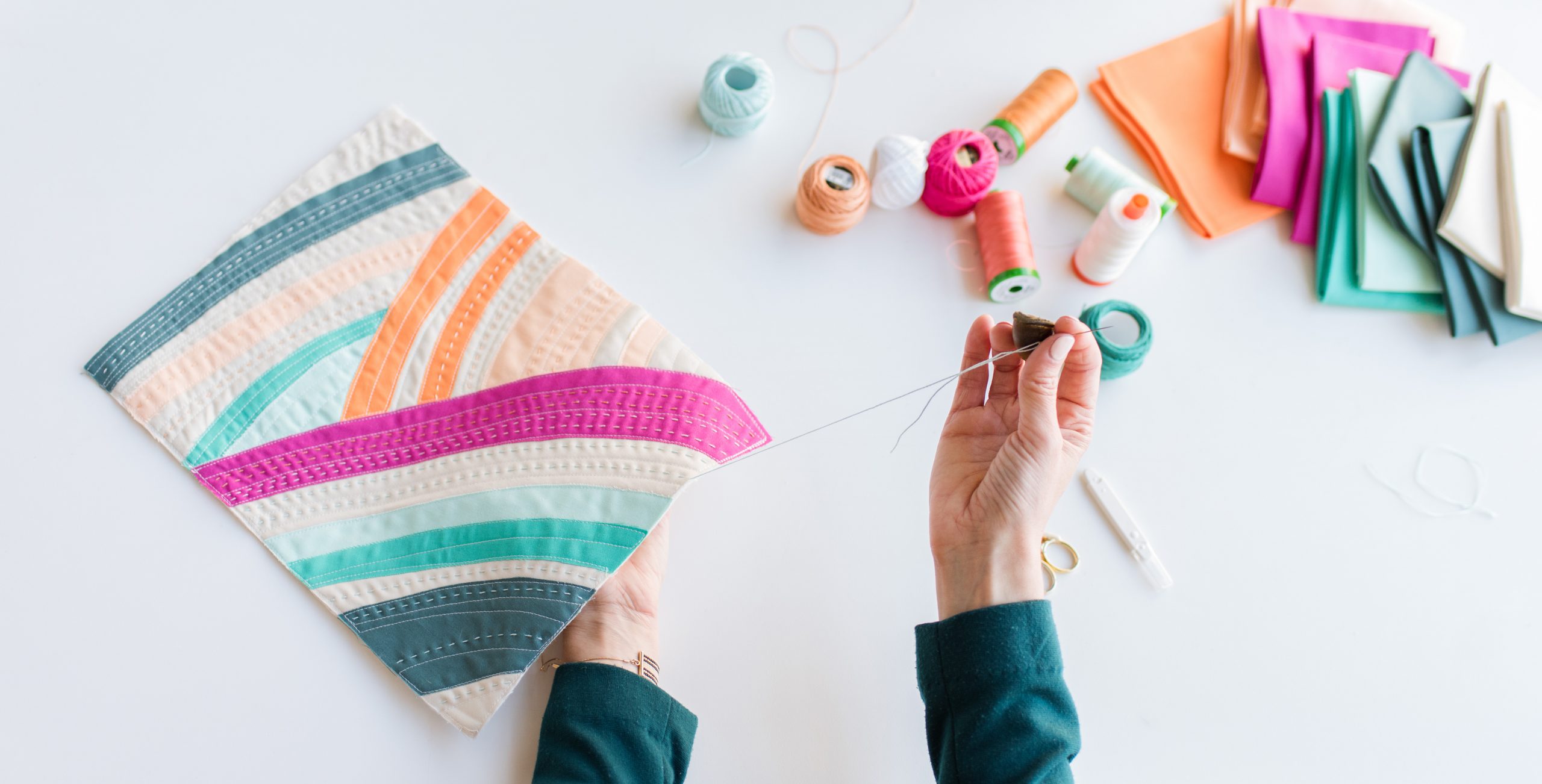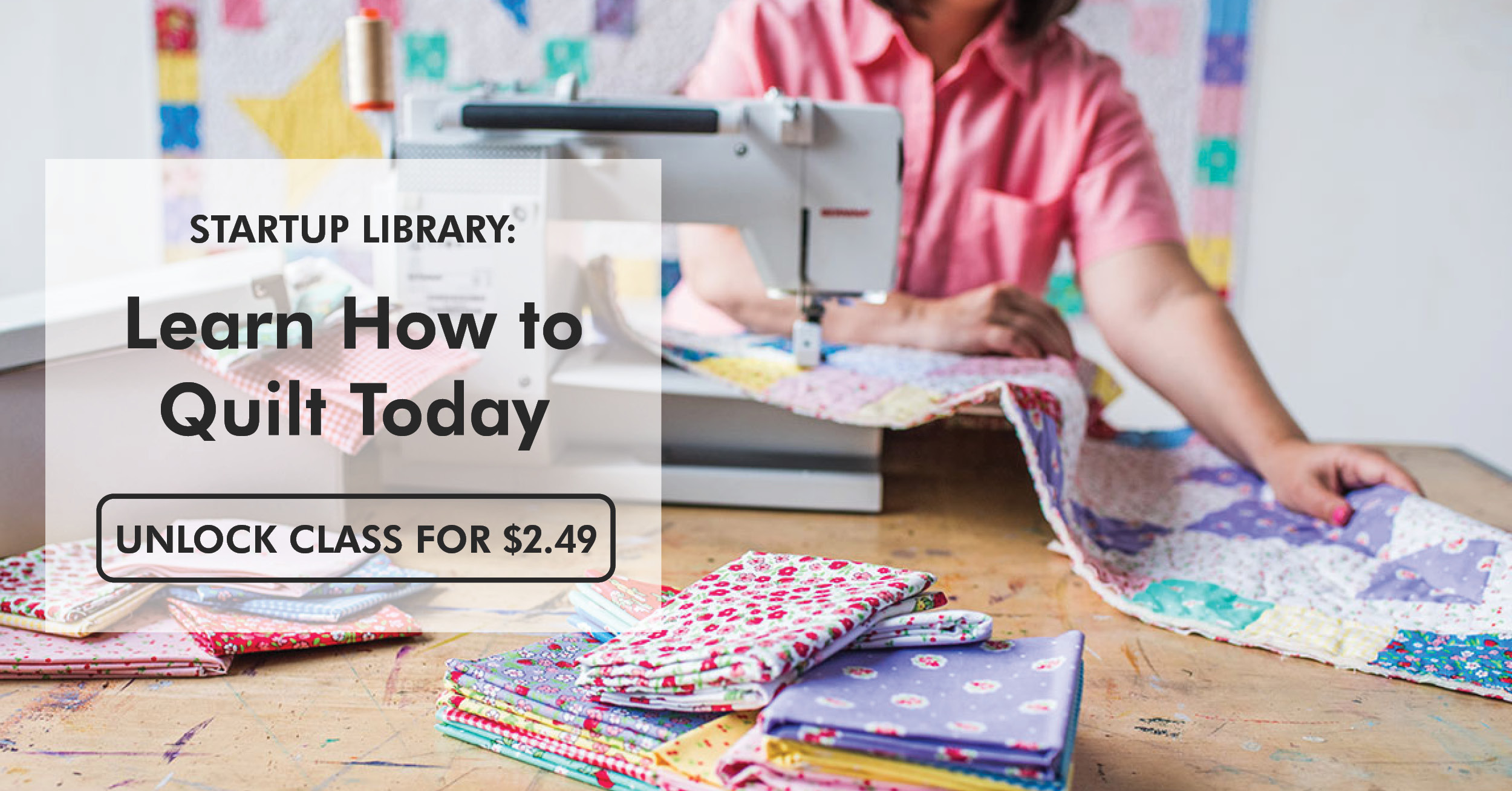
Fact: sewing your quilt (or a smaller project, like pillow tops and table runners) by hand provides a soft finish that really can’t be achieved by machines. Not to mention there isn't anything that beats the zen of sewing something with needle and thread. If you're interested in trying the craft, these tips for hand quilting — along with the right supplies — can help you get started.
What You Need
There are a few must-have supplies to help you master the art of hand quilting.
1. Needles
The size of your needle can make a big difference. Most hand-quilting pros agree that a size 10 is ideal — the eye isn’t too big or small, and the needle is strong enough to handle a quilt's many layers.
2. Thread and Conditioner
If you're using all-cotton fabric, it's best to use a cotton thread. You may have to try a few different types to find one that's both durable and easy to work with. Once you've got it, coat the thread with a conditioner like Thread Magic to help keep it from knotting as you stitch.
3. Quilting Hoops
There are all sorts of hoops on the market, including handheld hoops, lap hoops and standing quilt hoops. When hand quilting smaller projects, like pillow cases, you may not even need a handheld hoop. But for a project like a throw, hoops can be useful.
Pro Tip: Don't place the quilt too tightly in the hoop, like you would when embroidering. The fabric needs to be able to move up and down as you work, so make sure there's enough give.
How to Hand Quilt
Here are some pointers for getting started with hand quilting.
1. Cut the Thread
Your thread should be roughly 18" — any longer and it'll tangle; any shorter and you'll have to switch threads frequently. Once you've got your length, tie a small knot at the end. Pull the needle and thread through the back of the quilt, bringing it up at the exact spot you want to start hand quilting. Give a slight tug so the knot goes through the backing fabric, but doesn’t pull all the way through. This way the knot will be hidden inside the quilt.
2. Start Stitching
Keeping your stitches small and even is the most important part of hand quilting. A good goal is six stitches per inch. As you become more skilled, you can shoot for anywhere between eight and 12 stitches per inch.
Pro Tip: Keep one hand underneath the quilt and one hand above. Your bottom hand steadies the fabric while guiding the needle all the way through to the back of the quilt and moving it back to the top. Your top hand moves the needle down into the fabric and up again.
3. Load the Stitches
As your top hand guides the needle up and down, don't pull the thread all the way — load two or three stitches on your needle instead. Then you can pull the thread all the way through, taking care to keep the tension even. Continue in this manner until you're done sewing that particular piece, then move onto the next one.
Learn Hand-Quilting Techniques
Award-winning quilter Andi Perejda introduces the rich tradition of hand quilting. Learn how to choose fabrics, threads and motifs for beautiful results!


would like to learn hand quilting
I've been making quilts for 40 years . I machine quilt each 12" block , then put the blocks together . My great Aunts used to hand quilt their quilts together . one j had her full quilting rack , in her dining room . Anytime there would be a large family gathering there , she'd just "mpve" her quilt to a spare bedroom , out of the way . I have a new , full quilting rack , that has not even been set up yet . My husband doesn't want it set up , out where people could see it . I have ALL of my sewing projects , marerials and tools , in a spare bedroom , that I can close the door on . That is MY AREA and I'm the only one that enters it . He has the finished downstairs and the attached garage that is HIS AREA . I'm hoping that one day , I might be able to set my quilting rack up
Long term machine sewer but neck surgery put the “kabosh” on that! Always wanted to quilt so hand quilter might be the answer!
I would love to hand quilt and do it correctly so i can fet 6 stitches to an inch to start.
<strong>Ticket #45604</strong> What is the best batting to use for hand quilting? I’ve machine pieced a lot of quilt tops but always had them machine quilted.
<strong>Ticket #45602</strong> Would a sashimi type stitching worlk please
My grandmother did all her quilting by had, both piecing and quilting the quilts. I was blessed with her living until I was past 40. She taught me so many things. I still have several of her quilt tops. They are beautiful. I love then. I piece mostly by machine, except applique is done by hand. I quilt my quilts by hand.
I have done small projects, but would love to learn a correct technique.
I would love to learn hand quilting!
I have hand quilted a couple of cushions but very basically I would love to learn how to do it correctly